新东方英语笔记
- 格式:doc
- 大小:50.50 KB
- 文档页数:11

新东方高中3500 核心词汇速记班笔记整理字母:A牛,尖锐B孕妇,房子C拿,喊叫,运输D门,向外引导,挖E向外,由内而外发散的,窗,眼睛F标记(大部分表示的是不好的标记),飞G搬运,土地H梯子,高,篱笆,手,拥抱I自己(eg:im-否定)J跳跃(这个字母出现在莎士比亚后期)K嘴,口L长度,拉伸,手臂,腿M山,水N标准,门O嘴,圆形的东西P手掌Q女性(女性的背面),敏捷、迅速(猴子)R芽,草,直立,旋转,路S曲线,牙齿,切分T连接,舌头,标记(正向的标记)U(由V 演变而来)V水,胜利,路,看W水,女性(两个V 连起来是W)X未知,愈Z曲线字母互变规律:1.元音字母互变规律eg: do-de ad-ac2.辅音字母互变规律eg: f-v b-p r-l-n(南方人老奶奶热牛奶—lao lai lai le liu lai)3.字母同化规律eg: a+相同的两个字母,则a+第一个字母=ad4.字母省略规律eg: already的al 实际上是all,“全部”的意思5.字母错位规律词根:acu:尖端acute 尖锐的ag:做,行动agency代理处;agenda 议程agri:田地,农业agriculture 农业ann: 年annual 每年的astro,aster :(star) 星星,天体disaster灾难;astronomy 天文学audi, audit 听:audible 可听见的;audience 观众,听众bi,bio:生命:biology 生物学biography 传记brillil :发光:brilliant 闪耀的ceed,cess 走:access进入;process程序;succeed成功;accessible易接近的ceive: 拿,抓:receive收到cept : 拿,抓: accept 接受;concept 概念,观念;except 除⋯以外;reception接待circ,cycl :圆,圈,环:circle圆圈;cycle 循环cid : 切,落下: accident意外; incident 事件cline:倾斜: decline 下降衰败clud :关闭:conclude 完成,结束;include 包括,包含cogn: 知道:recognize认出,承认cred: 相信: credit 信赖cur curr: 跑,发生:occur发生;current 当前的;currency货币;curriculum程课cur: 关心: accurate准确的;accuracy准确的cuse : 理由:accuse谴责dic,dict:说:dictionary 字典;predict预言预报duc,duct :引导,带来:conduct 引导;educate教育equ :平等,相等: equal相等的; adequate足够的,适当的fect:做:effect 效果fend:打击:defend 防御;防护fer:带来,拿:conference会议; refer 提到;differ 有区别; suffer 受苦fic,fit: 做:beneficial 有益的;benefit 使受益flect,flex:弯曲:reflect 反射,反映;flexible 柔软的,灵活的flu : 流动:fluent 流畅的;influence 影响fuse :流:confuse 是糊涂,搞乱gener:产生: generous慷慨的grad:级:graduate毕业gram,graph:写,画,文:diagram图表;telegram电报;photograph照片gress:行走:progress进步,上进;aggressive侵略的hes:粘附:hesitate 犹豫,踌躇hibit:拿住,持着prohibit 禁止,阻止ident:相同identity 一致init:开始:initial 开始的,最初的ject:投,扔:object 反对;reject拒绝jud:判断:prejudice偏见jur:法律:injure 法律的lect:收集,讲:collect 收集;lecture讲课lect,leg:选:select选择,挑选;elect(投票)选举;elegant文雅的,雅致的leg:法律:legal 法律的lim :限制:limit 限制,限定liter:文字,字母:literary 文学的;literature 文学loc:地方:allocate分配,配给;local 地方的log:说:apologize道歉;dialogue对话main:留:remain余下,留下maj:大:major 主要的mand:命令:command命令;demand要求mat:动:automatic自动的medi:中间:medium 中间的;媒介memor:记忆:memory记忆;memorial纪念物,纪念碑ment:想;心智:mental 精神的,脑力的;mention 提及,说起mir:惊奇:admire钦佩,羡慕miracle 奇迹miss,mit:送:admission准许进入;admit 承认;commitment 献身,投入;dismiss解雇mob:动:mobile 活动的,可移动的mod:方式;风度:modest谦虚的mor:道德:moral 道德的mot,mote:动,移动:promote 促进,提升;remote 遥远的noc:伤害:innocent纯真的numer:数量:numerous多的,大量的oper:工作:operate操作;operation 手术optim :最好:optimistic乐观的par:相等separate(使)分开,(使)分离pass:感情:passive被动的;消极的pend:悬,挂:depend 取决于pens:花费:expense费用,支出pet:追求,寻求:compete竞赛competence能力ple:满,填满:complete完成;结束ply:重叠:apply应用:multiply 增加supply 供给port:拿,运:portable轻便的;transport运输;export 出口pos,posit:放:oppose反对;positive积极的;expose 暴露,揭露preci:价值:appreciate欣赏;precious 宝贵的,珍贵的prim,prem:第一,首要:primary 首要的;premier首相,总理priv:私有:private 私人的;私营的puls:驱动,推:compulsory义务的punct:刺:punctual 准时的physic:自然:physical 客观存在的rect: 正,直:correct 改正,纠正; rectangle长方形rupt: 断裂: corrupt 腐败的abrupt 突然的,意外的sacr: 神圣的:sacred庄严的,神圣的;sacrifice牺牲,奉献scribe:写: subscribe订阅describe描写sect:切割:insect昆虫sembl:类似的:resemble 像,类似sens:感觉:sensitive敏感的sert:加入,插,放:desert遗弃; insert 插入sist,stat,stant:站:consist 由⋯组成;consistent一致的;constant不断的;insist坚持; instant 立即的; status 身份,地位solut :松开:absolute 完全的spect:看:aspect外表;respect尊重;inspect检查,察觉sphere:球体:atmosphere 大气statute:建立:institute 建立,设立sume:拿,取:assume承担surd:不合理的:absurd 荒谬的tain:拿住: contain 包含,包括tach:钉:attach 粘上,系上tempor:时间:contemporary 同时代的; temporary暂时的tend,tens;伸展:tendency倾向,趋势;tension 拉紧,张力tent:张开:intention 意图,目的tract:拉:attract吸引;abstract概要tribute:给予:contribute 捐献turb:搅乱:disturb扰乱urb; 城市: urban城市的urg:驱动,驱使:urge 催促,力劝;urgent急迫的,紧急的vac:空:vacant空的vail :价值:available可用的vent:来:adventure 冒险;prevent 阻止vers,vert :转a dvertise做广告;anniversary 周年纪念;controversial争议的;diverse不同的,多种多样的;universe宇宙vis,vid:看:advise劝告;evident明显的vit ,viv ,vive:生命:survive 比⋯活得长;vital 生死攸关的;vivid 生动voc:声音,喊叫:advocate 提倡;鼓吹void:空: avoid 避免,躲开wis,wit :知道,了解:wisdom 智慧;witness 目击,作证:前缀a- 表加强:alike 相似的; available 可用的在⋯:aside 在旁边ab- 离去:absent 不在的;abrupt突然的的表加强:absolute 完全的;absurd 荒谬ac-(ad-的一种形式)靠近:access进入责表加强:accurate 准确的;accuse谴ad- 靠近:admission 准许进入表加强:admire钦佩; advocate 提倡ag- (ad-的一种形式)表加强:aggressive 侵略的al- (ad-的一种形式)表加强:allocate 分配ambi- 两,两边:ambiguous 不明确的an- (ad-的一种形式)表加强:announce 宣布,宣告ap- (ad- 的一种形式) 表加强:appeal 呼吁;apply应用;appoint 任命ar-(ad-的一种形式)表示加强:arrange 安排as-(ad-的一种形式)表示加强:aspect 外表;assume 承担at-(ad-的一种形式)表加强:atmosphere 大气;attempt试图,尝;attract吸引auto- 自己,自动:automatic 自动的bene- 善,好;beneficial 有益的;benefit 使受益cata- 下面:catastrophe 灾难;category 种类col- (com- 的一种形式)表加强:collect 收集com- 共同:combine (使)结合;comment评论表加强:command 命令;commitment 献身;投入con- (com- 的一种形式)共同:conference 会议;confuse 使糊涂;consistent 一致的:conduct 引导;管理;constant 不断的表加强contra- 反: contradict 同⋯抵触;contradictory 互相矛盾cor- (com- 的一种形式)全部:corrupt 腐败的表示加强:correct 改正;纠正de- 表加强:declare 宣布,声明;describe 描写向下: decline 下降;decrease 减少,减小弃使没有:defend 防御;防护;desert遗去掉:desperate 令人绝望的di- 双,二:dioxide 二氧化物的(dis-的一种形式)分开:divide 划分;diverse 不同的,多种多样dia-贯通,透过,相对:diagram图表,图样dif- (dis-的一种形式)不,分开:differ 有区别dis- 分开:dismiss 解雇;disturb扰乱; distribute 分配否定:disappoint 使失望;disadvantage 不利条件;disabled 残疾的disagree 不同意;disaster灾难分离:discourage使气馁现去掉:discover发e- 出:educate 教育;elect(投票)选举;erupt 爆发ef- 出:effect 效果em-进入:embarrass 使困窘en- 使⋯: enlarge扩大,放大;encourage 鼓励,激励进入:envelope 信封境在⋯中:environment环ex- 表加强:exact 精确的出:explode 爆炸;expose 暴露;explicit 清楚的;expense费用,支出前任:ex-husband 前夫;ex-president前总统extra- 以外:extraordinary 非凡的fore-预先:forecast预测,报前:forehead前额il- (in-的一种形式)不:illegal 非法的im-(in-的一种形式)不,无:immediately 立即in- 不:innocent 清白的,纯真的;independence独立的inter- 在⋯之间:interrupt 打断interval间隔,间隔;interview 会见,面试ir-(in-的一种形式)不,irregular 不规则的进入:irrigation 灌溉micro- 微,小:microscope显微镜m icrowave 微波mini- 小:minimum 最小量,最小值mis-错,不:mistake错误,弄错;misunderstand误会,不理解multi- 多:multiply 相乘,增加non- 不,无,非:non-stop不停的ob- 逆,反:object 反对的靠近:obvious 明显表示加强得:obtain获oc-(ob-的一种形式)表加强:occur发生,出现op- (ob 的一种形式)反:oppose反对;opposite相反,相反的per- 自始至终:permission允许;permanent永久的,持久的贯穿:perfume香味post- 在后面:postpone 推迟,延期pre-预先:predict预言,预报;prescription处方,药方;preview预习在前的:previous在前的,早先的pro- 向前:proceed程序;progress进步,上进;prohibit 禁止,阻止支持,provide 提供re- 相反:react反抗;reflect 反射,反映;reject 拒绝重新:recite背诵;recover重新获得;reform 改革;recycle回收一再:recommend推荐;relax 放松;remain余下,留下的离开:remote遥远出,承认;remove移动:recognize认表加强se- 分开:select现出;separate分开,分离semi- 半:semicircle 半圆step-后,继:stepmother继母sub- 下级的:submit 提交,递交;substitute 替换下面:subscribe订阅suf- (sub-的一种形式)在下面:suffer 受苦super- 在⋯上面superior 上级,较高的sur- 超过:surplus剩余;survive 比⋯活得长sus-(sub-的一种形式)在⋯下面:suspect怀疑;suspension悬挂;暂停sym-共同,相同:symptom 症状;sympathy同情;symphony交响音乐tele-远:telescope望远镜trans-转:transform转变,换;translate翻译;transport运输,传送:transparent透明的超过un- 不:unbearable无法忍受的;unbelievable难以置信的;unconditional 无条件的under- 在⋯下:underline 在⋯下面划线在⋯内:underwear内衣up- 向上:update 更新;upward向上with- 向后:withdraw缩回,撤回后缀:-able (形容词后缀)可⋯的,有⋯性质的:portable 轻便的; stable 稳定的; reliable 可靠的; available 可用的 -ably (副词后缀)构成以 -able 结尾的形容词相应的副词:probably 很可能,大概-age (名词后缀)表性质、状态:storage 贮藏,储存-al (形容词和名词后缀)表人、物、行为,⋯ 的:criminal 罪犯; international 国际的-an (形容词和名词后缀)⋯ 的,表人American 美国的,美国人 ; urban 城市的-ance (名词后缀)表性质、状态、动作:importance 重要性-ant (形容词和名词后缀)表人或物,⋯ 的:applicant 申请人 important 重要的-ary (名词后缀)表人、物、场所 ,⋯ 的:secretary 秘书; library 图书馆; literary 文学的-ate (动词、名词、形容词后缀)做,使⋯ ,表人,⋯ 的:calculate 计算; graduate 毕业,毕业生 ; private 私人的 -atic (形容词后缀)⋯ 的 :bureaucratic 官僚政治的; systematic 系统的-ation (名词后缀)表状态、动作、过程、结果:education 教育; generation 代,一代-ative (形容词后缀)⋯ 的: alternative 选择性的-ator (名词后缀)表人,物: educator 教育家; calculator 计算器 -cide (名词后缀)杀: suicide 自杀, pesticide 杀虫剂-cy (名词后缀)表性质、状态: accuracy 准确性-dom (名词后缀)表状态、身份、领域: freedom 自由; kingdom 王国 -ed (形容词后缀)⋯ 的 excited 激动的-ee (名词后缀)表人: employee 雇员-eer (名词后缀)表人: engineer 工程师-e词、)使,似⋯ 的: sharpen 削减; golden 金黄色的 -ence (名词后缀)表性质、状态、行为: difference 区别; confidence 自信 -ency (名词后缀)表性质、状态、行为:emergency 紧急情况; tendency 倾向,趋势-ent (形容词后缀)⋯ 的:different 不同的; independent 独立的-er (名词后缀)表人或物:employer 雇主; computer 计算机-ern (形容词后缀)表方位,⋯ 的southern 南方的 ; eastern 东方的-ery (名词后缀)表场所、状态、行业:bakery 面包店 bravery 勇敢-ess (名词后缀)女性(人),雌性 (动物 ):hostess女主人;actress女演员-etic(形容词后缀)⋯的:energetic精力旺盛的-ety(名词后缀)表性质、状态:variety 种种,种类;safety安全-eur(名词后缀)表人:amateur业余活动者-faction(名词后缀)表情况,状态,行为:satisfaction满意-fic (形容词后缀)⋯的:scientific 科学的-ful(的,有⋯的:skillful 熟练的;successful成功的;handful 一把;hopeful 有希望的-fy(动词后缀)使得;使⋯化:satisfy 使满意-h o o d ):childhood 童年;neighbourhood 四邻-ia(名词后缀)表性质,状态:criteria标准;media媒介-ial (形容词后缀)⋯的:facial 面部的;initial 开始-ian(形容词和名词后缀)⋯的,⋯人:Canadian加拿大,加拿大人;Christian 基督教徒-ibility (名词后缀)可能性:possibility 可能的-ible (形容词后缀)可⋯的,有⋯性质的:accessible可进入的;terrible 可怕的-ibly (副词后缀)可能地:possibly 可能地-ic(形容词和名词后缀)⋯的,表人:economic经济的;alcoholic 酒精的;饮酒过度的人-ical(形容词后缀)⋯的,有⋯的:sceptical怀疑的;theoretical 理论-ician(名词后缀)表人:physician医生;politician 政治家-icity (名词后缀)表性质、状态:electricity电,电流-ics(名词后缀)学科:mathematics 数学;physics物理学-id(形容词后缀)⋯的:acid酸的-ier(名词后缀)表人或物:solder士兵;barrier栅栏-ify (动词后缀)使得;使⋯化:clarify 澄清,阐明;classify 分类-i l e ()⋯ 的,可⋯ 的: fragile 易碎的,脆的; mobile 活动的,移动的 -ion (名词后缀)表状态、动作、过程: tension 紧张,拉力; decision 决定 -i s h ()如⋯ 的,稍⋯ 的,使⋯ 造成: foolish 愚蠢的; distinguish 区别,辨别;selfish 自私的 -ism (名词后缀)主义,学说: Buddhism 佛教; communism 共产主义; socialism 社会主义 -i s t )⋯者,从事⋯ 的人: socialist 社会主义者; specialist 专科医生; scientist 科学家 -ition (名词后缀)表性质、行为: competition 比赛,竞争; composition 作文; exhibition 展览; position 位置 -i t y ): similarity 类似; ability 能力 -ive (形容词和名词后缀)⋯ 的,表人或物: subjective 主观的; supportive 支持的; aggressive 侵略 -i z )使⋯ 化: apologize 道歉; recognize 认出; realize 认识到 -less (形容词后缀)不,没有: hopeless 没有希望的; sleepless 失眠的; stainless 无瑕疵的 -logy (名词后缀)学科: psychology 心理学-ly (形容词和副词后缀)⋯ 的,每⋯ 的,⋯ 地:friendly 友好的 ;daily 每天的; carefully 小心地; conveniently 方便地 -me n t )表物: punishment 惩罚; encouragement 鼓励; agreement 同意 -ness (名词后缀)表性质、状态: fierceness 强烈的; kindness 仁慈的; friendliness 友好的 -or (名词后缀)表人: editor 编辑; educator 教育家 -ory (形容词后缀)⋯ 的 contradictory 矛盾的 -ous (形容词后缀):various 各种各样的 ; courageous 英勇的-ship (名词后缀)表状态,性质,身份:friendship 友谊: membership 会员资格-sion (名词后缀)表行为,状态:decision 决定; expression 表情,表达法-some (形容词后缀)充满⋯ 的,令人⋯ 的 :tiresome 令人厌烦的 ;troublesome 讨厌的 -th )第⋯,⋯之一,sixth 第六; warmth 温暖的,暖和 -tic (形容词后缀)⋯ 的: enthusiastic 热情的: fantastic 极好的,美妙的 -tion (名词后缀)表行为、状态:instruction说明;intention计划,意图;invention发明-tude (名词后缀)表状态;altitude 高度,高处-ty(名词后缀)表性质,状态、数量:activity 活动;certainty 肯定;plenty 大量-ual(形容词后缀)⋯的:punctual准时的;visual视觉的,视力-u r e ):agriculture农业;pressure压力,压强-ward (形容词和副词后缀)表方向、方位:upward 向上forward 向前地-wards(形容词和副词后缀)表方向,方位:upwards向上地;outwards向外-y()有⋯的,多⋯的,所:twenty 二十;discovery发现;sunny有阳光的;hairy 多毛的。
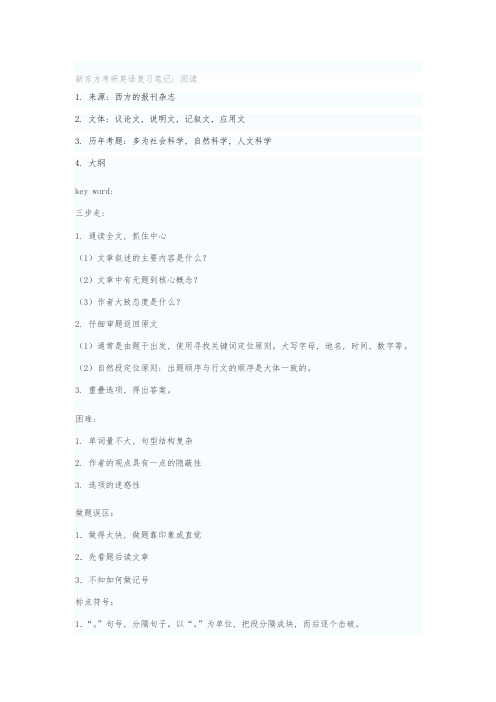
新东方考研英语复习笔记: 阅读1. 来源: 西方的报刊杂志2. 文体: 议论文, 说明文, 记叙文, 应用文3. 历年考题: 多为社会科学, 自然科学, 人文科学4. 大纲key word:三步走:1. 通读全文, 抓住中心(1)文章叙述的主要内容是什么?(2)文章中有无题到核心概念?(3)作者大致态度是什么?2. 仔细审题返回原文(1)通常是由题干出发, 使用寻找关键词定位原则。
大写字母, 地名, 时间, 数字等。
(2)自然段定位原则: 出题顺序与行文的顺序是大体一致的。
3. 重叠选项, 得出答案。
困难:1. 单词量不大, 句型结构复杂2. 作者的观点具有一点的隐蔽性3. 选项的迷惑性做题误区:1.做得太快, 做题靠印象或直觉2.先看题后读文章3.不知如何做记号标点符号:1.“。
”句号, 分隔句子。
以“。
”为单位, 把段分隔成块, 而后逐个击破。
2.“, ”逗号, 两个逗号之间是补充说明成份时, 在阅读过程中可以跳过去不读。
3.“:”冒号, 后面进一步补充说明前面的内容, 冒号的前后有一个从抽象到具体的过程。
4.“;”分号, 并列结构, 语义上的并列, 结构上的并列。
5.“——”破折号, 两个“——”之间是补充说明成份, 可以先不去读。
6.““”“引号, 引用某人的观点, 反讽, 讽刺。
7.“()”补充说明, 解释生词。
例证题:1. 当文中出现example, case, illustration2. 返回原文, 找出该例证所在的位置, 既给该例子定位。
3. 90%向上, 10%向下搜索该例证周围区域找出该例证的论点。
注意:举例的目的是支持论点。
4. 找出该论点, 并与4个选项比较, 得出选项中与观点最一致的答案。
5. 错误题的干扰特征经常是:就事论事。
词汇题:1. 返回原文找出该词会出现的地方2. 注意结合上下文理解该单词的意思3. 如该词回为简单词汇, 则其字面意思必然不是正确答案4. 词汇题的正确答案经常隐藏在干词汇的原文出现的附近5. 注意同位语、特殊标点、定语从句以及前后缀微观阅读方法:1. 抓主干2. 看标点符号3. 被动变主动4. 消减否定法5. 重新段句6. 对照法----即抓一些重点词(1)如in other words 等词组(2)转折词(3)表结果的词(4)表递进的词起、承、转、合注意引用目的: 不论是正面还是反面引述都是为了说明文章主题或主旨, 否则就无意义, 引述也就没有必要了。

Unit 12 Home Time单词1.do the dishesdish(单数):盘子/一盘食物dish washer:洗碗机plate:盘子2.read a bookread booksread on line:在线阅读read a magazineread magazines3.do homework不可数do much homework:做很多作业do my homeworkdo housework:做家务(不可数) 4.make a cakemake cakescupcake:纸杯蛋糕5.listen to musicpop music:流行乐jazz music:爵士乐句子1.What do you do at home?2.Do you have time? No, I’m busy.3.W hat are you doing? I’m doing the dishes. I’m reading a book. I’m making acake. I’m doing homework. I’m listening to music.4.W hat’s your hobby?5.She likes making cakes/reading books.6.He loves listening to music/doing the homework.7.H e doesn’t like doing the dishes.8.What else?随笔HobbiesW hat’s your hobby? My hobby is playing football. I often play football with my friends after school.My friends also have many hobbies. Amy likes making cakes. She often makes cakes on Saturdays and Sundays for her family.B ut my friend Leo doesn’t like making cakes. He loves reading. He has lots of books such as story books and science books. We often read book together.Do you have hobbies? Can you tell me?拼读-ueblue/ true/ glue。

新东方-新概念英语第三册笔记Lesson 01 A Puma at large 逃遁的美洲狮New words and expression 生词和短语学习词汇时仅知道汉语语义是不够的,要把单词放在语句中体会其应用学习关键句结构是则要把它放在段落结构或文章里puma n.美洲狮spot v.看出, 发现= see, pick out, recognize, catch sight of强调结果, 辨别出, 看见, 识别, 发现-- A tall man is easy to spot in the crowd.-- He has good eye for spotting mistakes.同意词:-- find:强调发现的结果/ find out:查出事实真相-- discover:做出重大发现/ notice:注意到-- observe:观察/ watch:观察活动中的人或画面Spot n.斑点-- There is a white spot on the shirt.on the spot有两个含义:1> 立刻, 马上(at once, immediately)-- Anyone breaking the rules will be asked to leave on the spot.2> at the place of the action 在现场-- Wherever she is needed, she is quickly on the spot.Evidence n.证据(不可数名词)Evident adj.明显的, 显然的/ evidently adv.明显地, 显然Evidence = proof (n.证据)-- When the police arrived, he had already destroyed the evidence.in evidence 显而易见的-- He was in evidence at the party.Accumulate v.积累, 积聚(强调积累的过程)-- As the evidence accumulates, experts from the zoo felt obliged to investigate. Gather vt.聚集, 把某人召集在某处-- The teacher gathered his students in the classCollect vt.搜集, 采集-- Do you collect stamps? Yes, I collect stamps as my hobby.(n.业余爱好)Assemble v.集合, 集会/ 装配-- A large number of people assemble on the square.Hoard vt.大量的储存(-- hoard up = store up 储藏)-- The squirrel hoards up nuts for the cold winter (squirrel n.松鼠)(nut n.坚果)amass vt.积聚(主要用于诗歌和文学作品)-- The clouds amassed above the hillsOblige v.使…感到必须feel obliged to do sth 感觉有必要做某事-- I feel obliged to say no to his demand(n.要求, 需要)be obliged to do sth 被迫做某事-- They were obliged to sell their car to pay their debts off.(debt n.债务)hunt v.n.追猎, 寻找(hunt for)-- The experts from London zoo began to hunt (v.) for a puma.-- The hunt (n.) for the puma proved the difficult. (prove vt.证明, 证实)search 搜寻某处为了寻找到某人或某物-- The police were searching the forest for the missing boy.run after 强调追赶, 追求-- look, a dog is running after a cat-- what are you run after in your lifeseek = pursue v.追寻(理想)chase v.追赶(-- They are chasing a thief / They are running after a thief)blackberry n.黑莓/ berry n.浆果human being 人类corner v.使走投无路, 使陷入困境作为动词, 经常使用被动语态-- The thief was cornered at last-- The problem cornered me.corner n.角落-- at the corner of the street -- in the corner of the room -- on the corner of the deskTrail n.一串, 一系列trail vt. 跟踪, 追踪(= follow)-- The police trailed the criminal to the place where he was hiding (criminal n.罪犯)Print n.印痕Cling v.粘(clung, clung, clinging)-- She is always clinging to her mother.-- He clung to the hope that he would succeed. 他怀有成功的希望stick v.粘住(-- stick the envelop)n.信封stick to 坚持(-- stick to the plan / stick to one’s promise)n.许诺sticky adj.粘的(-- sticky fingers)convince v.使…信服1>convince sb of sth -- I convince him of my honesty.(n.诚实, 正直)我使他相信我的诚实。
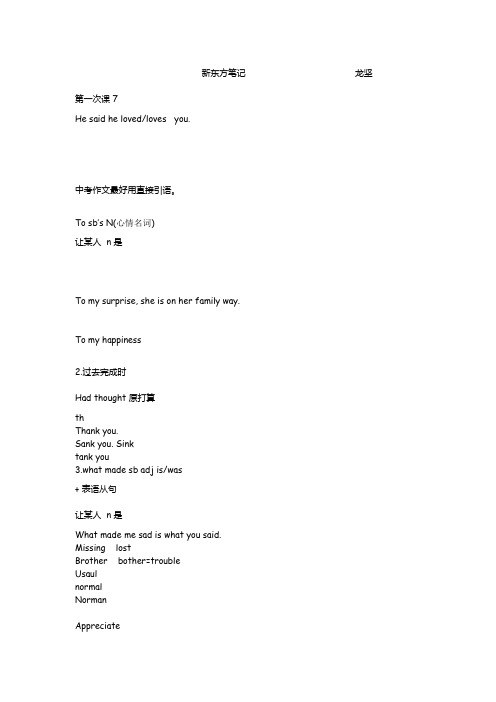
新东方笔记龙坚第一次课 7He said he loved/loves you.中考作文最好用直接引语。
To sb’s N(心情名词)让某人 n 是To my surprise, she is on her family way.To my happiness2.过去完成时Had thought 原打算thThank you.Sank you. Sinktank you3.what made sb adj is/was+ 表语从句让某人 n 是What made me sad is what you said.Missing lostBrother bother=troubleUsaulnormalNormanAppreciate感谢,赏识AgainSuper/supper man从句为过去时,主句必须为一般过去时。
第一题答案late /forneither /nor就近原则not /dotoo /toas /soon /asdid /take /toget /upgood at/do well inYou said it again.Bad apple.abnormalis weak at/in 不擅长be/ late/ forone/ of / players (athletes) NBANational basketball association MVP most valuable playerVIP very important personso / thatIn /spite/ of(尽管)Though/although/however+句子In spite of +短语Thank you!第二次课 14贴吧龙坚normanbfsu@normanbfsunos@QQ 2054649724972991优秀作文字数通常在要求的120%左右。
lively, alive ,livingMs Lee teaches lively.Near in byimpress im pressthe monitor said 职务前不单独加冠词the boss of the class1.the monitor of our class2.our monitor1)will be operated on2)have an operationdelay our classes ,cancelput off the operationput off the operation’s timeimpress sb with sth通过某事给人留印象The teachers from nos impress us deeply with their self-introductions. 罗勇School yard /campus校园学校通过校园给我留下深刻的印象。
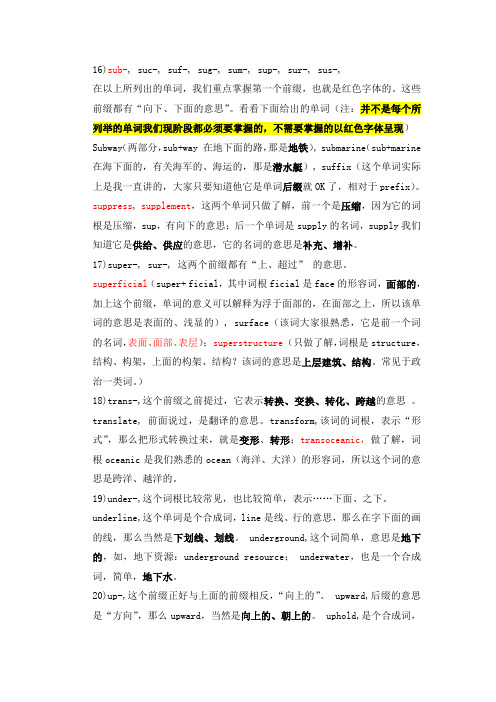
16)sub-, suc-, suf-, sug-, sum-, sup-, sur-, sus-,在以上所列出的单词,我们重点掌握第一个前缀,也就是红色字体的。
这些前缀都有“向下、下面的意思”。
看看下面给出的单词(注:并不是每个所列举的单词我们现阶段都必须要掌握的,不需要掌握的以红色字体呈现)Subway(两部分,sub+way 在地下面的路,那是地铁), submarine(sub+marine 在海下面的,有关海军的、海运的,那是潜水艇), suffix(这个单词实际上是我一直讲的,大家只要知道他它是单词后缀就OK了,相对于prefix)。
suppress, supplement,这两个单词只做了解,前一个是压缩,因为它的词根是压缩,sup,有向下的意思;后一个单词是supply的名词,supply我们知道它是供给、供应的意思,它的名词的意思是补充、增补。
17)super-, sur-, 这两个前缀都有“上、超过”的意思。
superficial(super+ ficial,其中词根ficial是face的形容词,面部的,加上这个前缀,单词的意义可以解释为浮于面部的,在面部之上,所以该单词的意思是表面的、浅显的), surface(该词大家很熟悉,它是前一个词的名词,表面、面部、表层);superstructure (只做了解,词根是structure,结构、构架,上面的构架、结构?该词的意思是上层建筑、结构。
常见于政治一类词。
)18)trans-,这个前缀之前提过,它表示转换、变换、转化、跨越的意思。
translate, 前面说过,是翻译的意思。
transform,该词的词根,表示“形式”,那么把形式转换过来,就是变形、转形;transoceanic,做了解,词根oceanic是我们熟悉的ocean(海洋、大洋)的形容词,所以这个词的意思是跨洋、越洋的。
19)under-,这个词根比较常见,也比较简单,表示……下面、之下。

Unit 16 Busy Life单词1.busy lifebusy:繁忙的business:生意、公司、买卖businessmanbusinesswomanlife:生活2.play table tennistennis:网球table:桌子a bed tablea tea tabledesk:书桌play volleyballplay badminton3.play the guitar4.play the piano5.play the recorderrecorder:录音机、竖笛球类不加the,乐器加the,中国乐器不加the.play pipaplay erhu6.do gymnasticsgym:体育馆句子1.He plays table tennis with his dad on Sundays.2.She plays the piano on Saturdays.3.He doesn’t play the recorder on Mondays.4.He likes playing the guitar on Thursdays.5.She doesn’t like doing gymnastics on Fridays.6.Li Ming plays volleyball on Tuesdays.语法动词变第三人称单数形式。
句子中主语为第三人称单数时,动词要变三单形式。
第三人称单数:它、他、她和人名、地名等。
变化规则1.一般直接加slikes makes2.o/s/x/ch/sh结尾加esdoes watches washes passes3.元音字母+y结尾直接加s,辅音字母+y结尾变y为i 加esplay—playsstudy—studies发音squsquaresquirrel。

Unit 17 Sports We Like单词1.sport:运动2.weusIme3.too:也,一般用在句子结尾also:也,一般用在句子中间4.have:有、吃I have lots of hobbies.I often have pizza for lunch.5.want to beWhat do you want to be?I want to be a footballer.He wants to be a doctor.6.rice7.banana milkshakeapple milkshakeshake:晃动8.chicken with potatoestomatochickenkitchen9.clubswimming clubfootball club10.often句子1.When do you do karate?2.I often do karate on Mondays and Thursdays.3.Josh plays football after school. He plays basketball too. He also playsbasketball.4.What does Josh want to be? He wants to be a footballer.5.What do you often have after playing sports?6.What does Josh often have for dinner?7.He often has pasta and soup for dinner.随笔My name is Aden. I am nine years old. My favourite sport is playing basketball. I want to be a basketballer. I play basketball on Saturdays and Sundays. I often go to a basketball club. Its name is Xiao Cheng. I also swim with my dad after school. I often have a sandwich and drink a bottle of milk after playing sports. Sports can make me strong and I can make friends.What’s your favourite sport?。

词根:fem/ femin 词根的意思是“女的,女性的”。
Female,和male相对,简单记一下male是男性,所以female则是女性。
因为“fe”读音同“非”。
从构词法角度看,female是由“fem+ ale(adj.词根)”组成。
由上面的词根意思可以得出这个单词的意思。
Feminine,同样也是跟女性有关的一个词。
意为“女性的、妇女的”Feminism这个词是由“femin+ ism(主义、思想)”组成。
那么它的意思是女性主义。
词根circum,它作为词根的意思是“环绕、周围”的意思。
第一个单词:circumstance,是由“circum+ stance”组成,这个stance是个名词性的后缀,和stand这个词很相近,这里理解为“站”,一个站着,它的周围是什么?当然是环境,周遭的意思啦。
Circumnavigate这个词同样也是两部分组成,这个词根后面的这个缀是navigate,是由navy加上“-gate”这样一个表示动词属性的缀,我们知道navy是海军,航海的意思。
那么navigate其实就是航海的意思。
再加上前面的词根,就是环航世界的意思。
Circumspect同样也是两部分组成。
那么-spect这个词根的意思是“看”,那么如果一个人在一个环境下东看看,西望望,说明这个人怎么样?应该是很小心谨慎的吧。
所以我们这样得出这个单词的意思。
好,我们看前缀com/ con, 那么它们俩的意思都是“一致、共同、完全”的意思。
第一个单词是combine,是由com+ bine 组成的,那么词根bine的意思是捆绑,集合的意思,所以combine就是联合、结合的意思。
记住它的短语叫:combine…with…。
Compatriot依然是两部分组成,后面patriot是爱国者,依据词缀含义,那么compatriot为:同胞。
Commend 由com+ mend 组成,mend作为词根的意思是“信任、命令”。
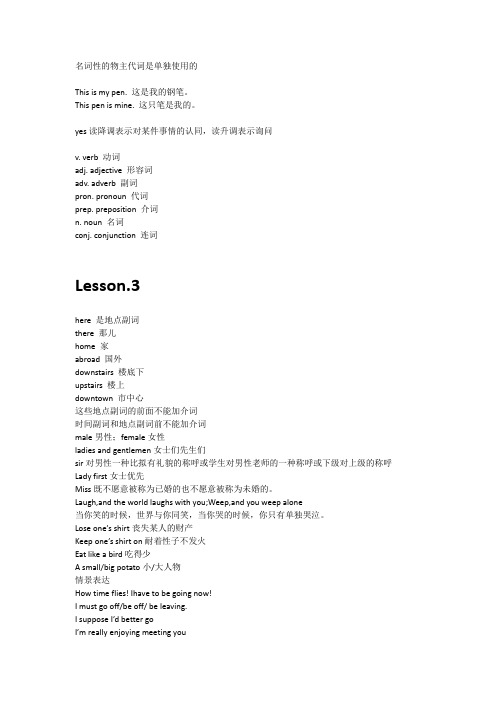
名词性的物主代词是单独使用的This is my pen. 这是我的钢笔。
This pen is mine. 这只笔是我的。
yes读降调表示对某件事情的认同,读升调表示询问v. verb 动词adj. adjective 形容词adv. adverb 副词pron. pronoun 代词prep. preposition 介词n. noun 名词conj. conjunction 连词Lesson.3here 是地点副词there 那儿home 家abroad 国外downstairs 楼底下upstairs 楼上downtown 市中心这些地点副词的前面不能加介词时间副词和地点副词前不能加介词male男性;female女性ladies and gentlemen女士们先生们sir对男性一种比拟有礼貌的称呼或学生对男性老师的一种称呼或下级对上级的称呼Lady first女士优先Miss既不愿意被称为已婚的也不愿意被称为未婚的。
Laugh,and the world laughs with you;Weep,and you weep alone当你笑的时候,世界与你同笑,当你哭的时候,你只有单独哭泣。
Lose one’s shirt丧失某人的财产Keep one’s shirt on耐着性子不发火Eat like a bird吃得少A small/big potato小/大人物情景表达How time flies! Ihave to be going now!I must go off/be off/ be leaving.I suppose I’d better goI’m really enjoying meeting youIt’s a pleasure to be with you here,but……I can’t believe that time has come to say goodbye to youThank you for all you’ve done for meLet’s keep in touch./Don’t forget to drop me a line.All the best to you./Remember me to your……We must get together again soon.Lesson.53个冠词a, an 是不定冠词用于:1、可数名字单数前面必须用不定冠词2、具有不确定意义的事或名词前面This is a watcha 用在普通名词前面,an 用于元音音素〔元音发音的单词〕前面a pen an apple an umbrella an egg an hour a universitythe 是定冠词,表示特指Look, look, a man is coming into the classroom.The man is my teacher.专有特指名词用theThe Great Wall选择疑问句:在两者或者三者中进行选择特殊疑问词or选择疑问句语调前升后降Are you a teacher or a student?I am a teacher.and 用在句首表示转折too 一般用于肯定句中either 也Lesson.7Shared joy is a double joy;shared is half a sorrow.Life is what happens to us while we are making other plans.生活就是经常发生的一些偶然。

一、spot(做动词时候) = see:强调结果、辨别出、看见、识别、发现。
find 强调发现的结果。
find out 查出事实的真相。
discover 做出重大的发现notice 注意到observe 观察watch 观察活动中的人或物二、on the spot1,===at once.2,at the place of the action 在现场wherever she is needed , she is quickly on the spot.in evidence:显而易见.三、accumulate 强调积累的过程gather 聚集,把某人召集在某处collect 收集,采集四、assemble 集合,集会,装配hoard 大量地贮存The squirrel hoards up nuts for the cold winter.amass 积聚(主要用于诗歌和文学作品)feel obliged to do sth.感觉有必要做某事be obliged to do sth 被迫做某事run after 强调追赶、追求.seek 追寻(梦想,理想)===pursuechase 追赶.be cornered ………被逼得走投无路常用于被动语态:The thief was cornered at lastThe problem cornered metrail==follow 跟踪convinced sb. of sth 使sb相信sthsb be convicned sb相信somewhat ==a littleat large1:逃遁的,没有被控制的。
2,详细的(in detail)3,总体来讲(as a whole)(An idea)…come to sb.某人突然想到了……take sth. seriously==deal with sth. seriously 严肃对待某事take sth. lightly: 草率对待某事声称曾经作过某事: claim to have done sthin the possession of sb==in sb's possession 归某人所有in possession of sth. 拥有某物take possession of 拥有It is disturbing to think that 一想到………就心里不安in a trap 落入陷阱中no more than ====== onlyequal:A equal B:None of us can equal her, either in beauty or as a dancer.be equal to + n: 有能力做某事 to- 介词recognized sb as 认出某人是whatever: ever 用来坚强语气get used to , be used to doget前调渐进的过程,be强调习惯了的状态In1,表达惊奇,恐惧,失望或生气等感情色彩的名词搭配连用in surprise; in astonishment;in alarm; in embarrassment; in amazement;in despair; in dismay; in anger; indisappointment2,表达以、用;用于语言,书写材料,色彩或声音等方面in English; in pencil; in ink ; in a few words; in such a high voice; in oil; in red; in code3,用于状态、情况或处境in trouble; in difficulty; in bed; in a hurry; in debt; in love with sb; in tears; in good order; in good repair; in good health;in por health. in the bad mood; in the good mood; in haste;in a favor of excitement; in poverty; in luxuryrun a shop 经营商店joined at the hip 表示交情极厚的Eg: There two are joined at the hipshoot from the hip 信口开河Eg: Sorry,i said that i shouldn't have shot from the hip……date from ……(风俗,习惯)从……开始happen to do 强调事情的偶然发生Eg: I happen to have dirven that kind of carIt happens that……Eg: It happnes that i met her on my way to workhappen on 巧遇,偶然发现Eg: I happend on this old picture in the back of the drawer.Guess, who i happend on while i was in london last month?turn out 表明结果turn out ( to be) + n/adj.Eg: Our part turned out (to be) a successthe concert turned out to be failure.It turned out that…………原来是(表示结果)Eg: It turned out that the diamond had been in the bank all the time.as it turns out 人们后来发现Eg: As it turns out, there was not need to worry.As it turns out, the report was mistaken.so far,up to now 都是现在完成时的标志beforhand:(a.) 事先== in advance.at this distance of/in time : 时隔已久Eg: I can hardly remember him at the distance of timefar more moneyfar--副词,用来强调语气==muchin the case of: 至于,就……而言Eg: Stealing is no shame in the case of him.in case of: 万一,以防Eg: You should ensure your house in case of firein a simple way: 简单的,简朴的Eg: She was always dressed in a simple way.go to extreme (to do)走极端Eg: He went to extreme to say that the play was the best one.journalist (杂志) 新闻记者reproter (电视台) 记者correspondent (电台)记者,通讯员sack(俚语) 解雇,辞退Eg: If you do it wrong again you will be sacked.instruct sb. to do sth ==tell sb. formally to do sth. 正式告诉某人做某事refuse: 拒绝(态度严厉)decline: 婉言谢绝repudiate: 断然拒绝set out to do sth.==decide and try to do 决定,打算,着手做=set about doing Ega: He set out to make his first 1,000,000 in 5 years倒装简述:not only 位于句首,必须采用倒装形式否定副词位于句首,要倒装。
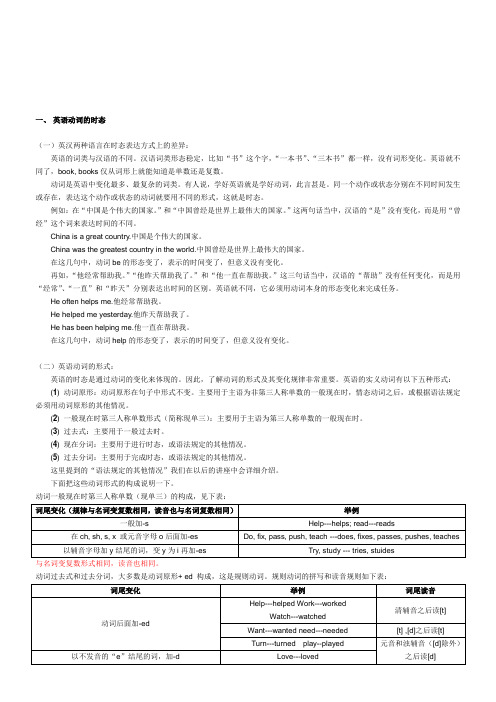
一、英语动词的时态(一)英汉两种语言在时态表达方式上的差异:英语的词类与汉语的不同。
汉语词类形态稳定,比如“书”这个字,“一本书”、“三本书”都一样,没有词形变化。
英语就不同了,book, books仅从词形上就能知道是单数还是复数。
动词是英语中变化最多、最复杂的词类。
有人说,学好英语就是学好动词,此言甚是。
同一个动作或状态分别在不同时间发生或存在,表达这个动作或状态的动词就要用不同的形式,这就是时态。
例如:在“中国是个伟大的国家。
”和“中国曾经是世界上最伟大的国家。
”这两句话当中,汉语的“是”没有变化,而是用“曾经”这个词来表达时间的不同。
China is a great country.中国是个伟大的国家。
China was the greatest country in the world.中国曾经是世界上最伟大的国家。
在这几句中,动词be的形态变了,表示的时间变了,但意义没有变化。
再如,“他经常帮助我。
”“他昨天帮助我了。
”和“他一直在帮助我。
”这三句话当中,汉语的“帮助”没有任何变化,而是用“经常”、“一直”和“昨天”分别表达出时间的区别。
英语就不同,它必须用动词本身的形态变化来完成任务。
He often helps me.他经常帮助我。
He helped me yesterday.他昨天帮助我了。
He has been helping me.他一直在帮助我。
在这几句中,动词help的形态变了,表示的时间变了,但意义没有变化。
(二)英语动词的形式:英语的时态是通过动词的变化来体现的。
因此,了解动词的形式及其变化规律非常重要。
英语的实义动词有以下五种形式:(1) 动词原形:动词原形在句子中形式不变。
主要用于主语为非第三人称单数的一般现在时,情态动词之后,或根据语法规定必须用动词原形的其他情况。
(2) 一般现在时第三人称单数形式(简称现单三):主要用于主语为第三人称单数的一般现在时。
(3) 过去式:主要用于一般过去时。

一、Integrated writing1)Read a passage(3 minutes/250---300 words)勿照抄,要改写2)Listen to lecture(2.5---3 minutes)听到啥,就写啥3)Made summary(20 minutes/150---225 words)标点之后要空格二、Independent writing1)Topic pool2)Develop an essay3)300 words +504)30 minutes—5①sb do sth,then do sth,and then do sth②不省略关联词③不能简单使用模版④句法多用,准确词汇选择⑤固定搭配the girl though herself on meThroughout my life, I have been luck enough to have a very good relationship with my parents. They have supported me, given me necessary criticism, and taught me a great dealabout how to live my life. Parents can be very important teachers in our lives. However, they are not always the best teachers.Parents may be too close to their children emotionally. Some times they can only see their children though the eyes of a protector. For example, they may limit a Child’s freedom in the name of safety. A teacher might see a trip to a big city as a valuable new experience. However, it might seem too dangerous to a parent.主题句切记过于具体①pass on sth to sb②friends of all different races and backgrouds③have narrower view考察能力:1、reading2、listening3、note taking4、writing5、typing6、writingHow to enhance writing skill1、content2、logic3、expression思维训练:Brain storming三大法则:两个不同,两次取非,两重关系站在不同人的角度,对事物的不同属性进行思考两个关系:1)因果关系&包含关系例子三大来源:1、生活经验2、阅读积累3、改编生造(换名词及与名词相应的动词):1)尽量生僻2)不要太夸张One can never do sth, without doing sth汉语拼音+同位语=英语专有名词使用例子:1、给出观点2、描述例子,注意细节3、与观点再次呼应收集例子:1、熟悉题库2、大量精读3、练习改写与缩写能力go smooth to be sth 容易做什么事sentence making1.常用句型(考试中的模版句型)2.句子改写(拿来主义)3.句子扩充(倒装,排比,复杂)常用句型1.提出单一观点:(1)There is a growing awareness that(只能用于引导星星观点)(2)There is a public recognition that(主流观点)(3)It is said that(似是而非的观点和名人名言)(4)There is no denying that(毫无疑问,不可否认)(5)One of the most popular topic sb talk about now is人们今天讨论最多的话题之一….(他人态度对我们态度的影响)it is commonly believe that 通常相信reference 参考take(sth) into account 仔细想想2.提出相对观点(1)When it comes to this problem, there is always a debate , some…, others…hold an opposite view 持完全不同的观点(to do sth, or to do sth? +When it…)(2)When it comes to……当…①Other research reveals that…when it comes to…②Recent resealed shows that…when it comes to…(3)When asked about…career/pursue 追求一种事业sb…but others think quite differnthysb do sth, and do sth(用设问开头!)(4)Nowadays(currently, recently) there is a growing(general, deep) concern over(awareness of, recognition of, demand for) 话题承受沉重压力bear the heavy burden为。

CET-4听力常考察与学生生活相关的场景小对话:一般选项中带有“改变”意义的为正确选项“乌鸦嘴”原则场景:1 汽车场景1)车坏了break down 抛锚,出故障 damage 损坏repair/fix 修理 garage 汽车修理厂2)买车used car 二手车(通常没有钱买新车)I can’t afford a new car.3)搭车give sb. a ride/lift 允许某人搭车4)借车答案肯定是不借(借钱的答案也是不借)☆2 医院场景(频率高)1)日常小病fall ill/come down with… 得病,病倒fever 发烧 high fever 高烧 flu 流感cough 咳嗽 bad coughheadache 头疼 dizzy 头晕 cramp 抽筋worn out 精疲力尽,浑身乏力twist one’s ankle 扭脚2)治疗手段take pills 服药 give sb. a shot 打针injection 注射 injection room 注射室prescription 处方3)治愈get over 恢复;克服 check out 治好,出院☆3 选课,退课场景course 课程1)选课选课不要选太多sign up for…/register for… 登记报名选课2)退课drop out of the school/drop school 辍学☆4 偶遇场景What a small place it is! 遇到不想见的人What luck running into you! 见到你真走运Fancy meeting you here. 真没想到在这遇到你Long time no see. 好久不见☆5 餐馆场景menu 菜单 dessert 甜点 soup 汤 snack 快餐apple pie 苹果派(听到就选“好吃”)pizza (听到就选“难吃,恶心”)go Dutch AA制=divide=go fifty and fiftyfull=be stuffed 饱了☆6 减肥场景gain weight/put on weight 体重增加lose weight/take off weight 体重减轻fat 肥(贬义) heavy/overweight/plump 丰满thin 瘦(贬义) slim 苗条,修长☆7 找工作场景思路:1)找到工作高兴2)失去工作伤心,跳槽也一样3)拒绝工作令人奇怪信息来源:classified ads 分类广告help and wanted section 供需关系栏打电话:Is the position still available?面试:interview resume 简历letter of application 申请fill in/out the form 填表☆8 论文场景paper,essay,thesis1) 论文难写2)打印错误多3)论文需要反复修改4)资料难查找5)选题困难☆9 锻炼身体场景morning exercise keep/stay fit 保持身体健康physical exercise as fit as a fiddle 身体健康in good/bad shape 身体好/不好☆10 打工场景1)teaching assistant (T.A.) 助教research assistant (R.A.)2) 商业部门餐馆 dish washing cook/chef 厨师商店 deliver the goods 送货3)house-sitting 看房子☆11 紧张场景原因:要考试,要发言(presentation, speech),要发奖学金(scholarship)表示紧张的词语:nervous, can’t sit still, be on edge, get cold feet, toss and turn, like a cat on hot bricks, on pins and needles☆12 天气场景1)单纯谈天气,天气将会继续恶化,变糟2)天气与户外活动有关:天气改变,原定户外活动取消3)天气和衣服有关相关短语:keep up, clear up, warm up, let up(雨慢慢减小了), forecast☆13 教师评价场景(议论老师)1)老师要求严A 准时上课 never late punctual 准时的B 经常拖堂 run late, run overtimeC 作业多,考试给分低2)老师讲课讲的好(少考)fascinating 非常好3)老师讲课讲得不好(常考)A 老师讲课没意思 boring, drop offIn his class, everybody becomes a clock watcher/ is watching his clock.B 老师讲课难,听不懂I can’t catch/follow…I am at sea. 迷茫,不知所措C 老师讲课太快,跟不上4)老师忙 office hour 坐班☆14 机场场景1)由于某种原因赶不上飞机:换票,换航班 switch2)由于某种原因机场关闭或航班延误,问什么时候恢复正常一般为天气或机械故障3)提问对话发生地点和说话人身份,熟悉常用词land, take off, board 登机,transfer 转机☆15 住房场景1)谈论租房女生为房东,男生为房客2)布置房子 furnish打扫,刷墙(请人刷) have it painted买家具(通常为second hand)dirt cheap 便宜3)抱怨房子A 房子小 I can hardly turn in my room.B 房子差C 相处难(合租)自己爱干净,室友dirty, messy自己爱安静,室友noisy☆16 书店场景1)有书还是没书in stock 有 out of stock 没有2)印还是不印in print 印 out of print 不印,绝版3)平装或精装paper back/cover 平装 hard back/cover 精装☆题型:1 意义解释题选项特征:选项基本为长句,主语基本相同What do you know from the conversation?What does … mean?重复原词越多的选项越有可能错(听到什么不选什么)考法:1)词义解释题:如果问原因要找根本原因2)词组意义解释题3)句子的意义解释题否定句:A) I can’t agree wi th you more/less.再同意不过了/根本不同意最后一个单词表示多、好、积极,表示肯定的意思最后一个单词表示少、坏、消极,表示否定的意思I can’t feel better/worse.B)Isn’t he?-He’s a disgusting man.-Isn’t he?否定的问句,不管多长,永远表示肯定C)He is anything but a man.He is nothing but a man.anything but 决不是(no/never)noting but 只不过(only)比较句:A)more … than = not as … as …B) nothing better than =only (肯定的最高级)I like nothing better than English.C)the last 否定的最高级You are the last person I want to see.D) 虚拟语气I wish/hope …在选项中找听到句子虚拟部分的否定形式If only … 要是…该多好(同上)2 细节混淆题选项:时间列举,人物,兴趣爱好,物品名称,地点列举边听边选,做记号3 人物动作行为题选项特点:选项为动词原形或带to的不定式考点:抓住动词4 对话发生地点题选项特征:介词+地点名词考法:对话直接提到的推理得出的将要去哪5 人物职业身份题选项特征:4个选项全都是职业名称What does the man do?Who do you think the man is?解题方法:通过线索词(信号词)/通过语气6 人物关系题选项特征:全部为职业+职业的组合What is the most probable relationship between the two speakers? 解题方法同上7 数字价格计算题选项特征:全部为数字+名词的组合1)表示和差倍数关系的关系词和固定搭配:double 双倍 divide 除buy sth. at … discount/knock 10% off the price 降价2)熟悉读法8 时间加减运算题选项特征:4个选项都是时间注:同义替换decade十年 fortnight 两周a few days ago=the other day 几天前最常出现的提前/推后的表达:提前:20 minutes early/ahead of time/ahead of schedule/in advance 推后:20 minutes late/behind time/behind schedule /to be delayed/postponedput off 20 minutes9 对话主旨题选项特征:选项全都是名词或动名词结构What are they talking about/discussing?尽量回忆第一个人说的话☆其他:1 表示费用的词语tip 小费 rent 租金 postage 邮资 fee 停车费,…费 fare 车马费,车船费 train fare admission 入场费 admission free 免费入场utilities 水电费toll 高速公路的收费站fine 罚款allowance 零花钱 tuition 学费2 电影类型horror film 恐怖片 thriller 惊险片science-fiction 科幻片 comedy 喜剧tragedy 悲剧 love story/romance 爱情文艺片art music 艺术片 epic film 史诗片western film 西部片 Kong Fu film 功夫片,武打片detective film 侦探片 cartoon/animation 动画片disaster film 灾难片 silent film 无声电影3 如何看选项1)注意意思上截然相反的两个选项,正确选项一般是其中一个2)注意结构上相似的两个选项,句子结构基本相同,只有一两个单词不同,正确选项一般是其中一个3)注意选项中的同形异义词或同音异形词,正确选项一般在其中4)注意选项中的人名和地名5)注意选项中的时间和数字6)注意排除含有表示范围的词语的选项only, each, every, all, any 只有在表示范围时才是错误选项7)注意排除表示绝对意思的选项absolutely, definitely, certainly8)注意排除有语言错误的选项4 言外之意题What does the man imply? What can we infer?选项特征:重复原词越多,越有可能是错误选项(越像越不是,越不像越是)☆Passage: 任何文章的开头和结尾必考考点:数字,时间,年代,地点如何看短文:1)听到什么选什么,尤其适用于说明文和议论文(选项动词为现在时一般为说明文和议论文)2)日常生活原则:根据常识选择原则:1)人名原则:出现人名的地方可能是考点2)数字原则3)因果原则:至少有2题为因果题,注意标志词原因:because, since, due to, thanks to, owing to结果:so, therefore, thus, consequently4)转折原则:注意转折连词but, however, yet, in fact, actually, to be frank, frankly speaking5)强调原则:A.语义的强调 remember, be sure, 最高级B.举例强调6)重复原则:包含有听到重复最多的单词的选项为正确选项7)建议原则:说明文及议论文中较多I suggest…, You should do…, Why not…? If I were you…8)问答原则:自问自答,答的部分是考点9)开头原则:文章前一两句10)尾巴原则题型&提问方式:1 中心思想归纳题What’s the main idea…? What can we learn…?利用重复原则2 事实和细节题3 正误判断题Which of the following is (not) true?4 词语解释题5 观点和态度题环境问题必问的3个问题:1 环境到底出了什么问题(答案在前3句)2 这个问题的起因是什么3 解决问题的方法是什么☆Compound dictation:1-7空每空填一词,每词0.5分,8-10空填长句(由2-3句组成),写出的句子与原句意思相同即可。

新东方高频词组笔记1.abide by(=be faithful to ; obey)忠于;遵守。
2. be absent from…. 缺席,不在3. absence of mind(=being absent-minded) 心不在焉4. absorb(=take up the attention of)吸引…的注意力(被动语态)be absorbed in 全神贯注于…近义:be engrossed ; be lost in ; be rapt in ;be concentrated on ; befocused on ; be centered on5. (be) abundant in(be rich in; be well supplied with) 富于,富有6. access(to) (不可数名词) 能接近,进入,了解7. by accident(=by chance, accidentally)偶然地,意外. Without accident(=safely) 安全地,8. of one’s own accord(=without being asked; willingly; freely)自愿地 ,主动地9. in accord with 与…一致. out of one’s accord with 同….不一致10. with one accord (=with everybody agreeing)一致地11. in accordance with (=in agreement with) 依照,根据12. on one’s own account 1) 为了某人的缘故, 为了某人自己的利益2) (=at one’sown risk) 自行负责 3) (=by oneself)依靠自己 on account 赊账; on account of 因为;on no account不论什么原因也不;of …account 有…..重要性.13. take…into account(=consider)把...考虑进去14. give sb. an account of 说明, 解释 (理由)15. account for (=give an explanation or reason for) 解释, 说明.16. on account of (=because of) 由于,因为.17. on no account(=in no case, for no reason)绝不要,无论如何不要(放句首时句子要倒装)18. accuse…of…(=charge…with; blame sb. for sth. ; blame sth. on sb. ; complainabout) 指控,控告19. be accustomed to (=be in the habit of, be used to)习惯于.20. be acquainted with(=to have knowledge of) 了解; (=to have met socially ) 熟悉21. act on 奉行,按照…行动; act as 扮演; act for 代理22. adapt oneself to(=adjust oneself to) 使自己适应于23. adapt…(for) (=make sth. Suitable for a new ne ed) 改编, 改写(以适应新的需要)24. in addition (=besides) 此外, 又, 加之25. in addition to(=as well as, besides, other than)除…外26. adhere to (=abide by, conform to, comply with, cling to, insist on, pe rsist in, observe, opinion, belief ) 粘附; 坚持, 遵循27. adjacent(=next to, close to) 毗邻的, 临近的28. adjust..(to) (=change slightly)调节; 适应;29. admit of (=be capable of, leave room for) …的可能,留有…的余地.30. in advance (before in time) 预告, 事先.31. to advantage 有利的,使优点更加突出地.32. have an advantage over 胜过. have the advantage of 由于…处于有利条件 have the advantage of sb.知道某人所不知道的事33. take advantage of (=make the best of, utilize, make use of, profit from, harness)利用.34. agree with 赞同(某人意见) agree to 同意35. in agreement (with) 同意, 一致36. ahead of 在…之前, 超过…;……………. ahe ad of time 提前.37. in the air 1)不肯定, 不具体. 2)在谣传中.38. above all (=especially, most important of all) 尤其是, 最重要的.39. in all (=counting everyone or everything, altogether) 总共, 总计40. after all 毕竟,到底; (not) at all 一点也不; all at once(=suddenly)突然; once and for all 只此一次; above all 最重要的; first of all 首先; all in all 大体上说; be all in 累极了; all but 几乎.41. allow for (=take into consideration, take into account) 考虑到, 估计到 .42. amount to (=to be equal to) 总计, 等于.43. answer for (undertake responsibility for, be liable for, take charge for) 对…负责.44. answer to (=conform to) 适合,符合.45. be anxious about 为…焦急不安; 或anxious for46. apologize to sb. for sth. 为…向…道歉47. appeal to sb. for sth. 为某事向某人呼吁. appeal to sb. 对某人有吸引力48. apply to sb. for sth. 为…向…申请 ; apply for申请; apply to 适用.49. apply to 与…有关;适用50. approve of (=consent to, be in favor of, favor, agree to, consider good, right) 赞成, approve vt. 批准51. arise from(=be caused by) 由…引起.52. arrange for sb.sth/to do sth. 安排…做…53. arrive on 到达; arrive at 到达某地(小地方);得出,作出; arrive in 到达某地(大地方);54. be ashamed of (=feel shame, guilt or sorrow because of sth. done) 以…为羞耻55. assure sb. of sth. (=try to cause to believe or trust in sth.) 向…保证, 使…确信.56. attach(to) (=to fix, fasten; join) 缚, 系 ,结57. make an attempt at doing sth. (to do sth.) 试图做…58. attend to (=give one’s attention, care and thought)注意,照顾;attendon(upon)(=wait upon, serve, look after) 侍候,照料59. attitude to toward …对…的态度.看法60. attribute…to…(=to believe sth. to be the result of…)把..归因于.., 认为..是..的结果61. on the average (=on average, on an average) 平均62. (be) aware of (=be conscious of , having knowledge or consciousness)意识到,知道.63. at the back of (=behind) 在…后面64. in the back of 在…后部(里面); on the back of 在…后部(外面); be on one’sback(=be ill in bed) 卧病不起.65. at one’s back(=supporting or favoring sb.) 支持,维护; have sb. at one ’s back 有…支持, 有…作后台66. turn one’s back on sb. (=turn away from sb. in an impolite way) 不理睬(某人),背弃,抛弃67. behind one’s back 背着某人(说坏话)68. be based on upon 基于69. on the basis of 根据…, 在…基础上70. beat…at 在…运动项目上打赢71. begin with 以…开始. to begin with (=first of all) 首先, 第一(经常用于开始语)72. on behalf of (=as the representative of) 以…名义73. believe in(=have faith or trust in; consider sth.sb. to be true) 相信,依赖,信仰.74. benefit (from) 受益,得到好处.75. for the benefit of 为了…的利益(好处)76. for the better 好转77. get the better of (=defeat sb.) 打败, 胜过.78. by birth 在出生上,论出身,按血统 at birth 在出生时; give birth to 出生79. blame sb. for sth. 因…责备某人 . blame sth. on sb. 把…推在某人身上80. in blossom开花(指树木) be in blossom开花(强调状态) come into blossom开花(强调动作)81. on board 到船上, 在船上, 上火车或飞机82. boast of (or about) 吹嘘83. out of breath 喘不过气来84. in brief(=in as few words as possible)简言之85. in bulk 成批地,不散装的86. take the floor 起立发言87. on business 出差办事.88. be busy with sth.于某事。

新东方考研英语辅导笔记阅读理解部分一、阅读文章1. 来源:西方的报刊杂志2. 文体:谈论文,说明文,〔记叙文〕,应用文3. 历年考题:多为社会科学,自然科学,人文科学4. 大纲5. key word: 1Close reading, 2阅读三步走 348精读击破法1 Close reading:第一、精读要到达:首先,分析文章,对题目中的四个选项要做分析。
正确的选项要做分析,错误的选项也要做分析。
其次,把文章中的单词要背会、要全部熟识把握。
长句子要摘取下来背诵,翻译。
对于重点文章,有时需要背诵全文。
其次、如何精读48篇文章:首先是单词量;其次是难句;最终是解题思路。
第三、对于文章则可以多角度的读,题目也可以多角度的分析。
248精读击破法复习方式:以点代面,切忌题海战术!第一、精度的角度。
首先是单词量;其次是对阅读中的长句、难句进行分析;最终要对题目进行分析。
其次、泛读的目的。
第一是增添背景学问;其次是熬炼抓住文章中心的力量。
第三、建议要读以下三本杂志:Time, Newsweek, Economist.二、阅读三步走:1. 通读全文,抓住中心〔不推举采纳先看题目后读文章的做法〕1) 通读全文。
1 首段 2 其他各段的段首段尾句。
2) 抓住中心。
1文章表达的主要内容是什么?2文章中有无提到核心概念?3大致看法是什么?2. 认真审题返回原文1) 通常是由题干动身,使用查找关键词定位原则。
大写字母,地名,时间,数字等。
2) 自然段定位原则:出题挨次与行文的挨次是大体全都的。
3. 重叠选项,得出答案。
重叠原文?即对比原文。
⑴原则一:1∶1原则〔通读时间与做题时间对等〕⑵原则二:首段原则〔不要怕重复和回读〕首段的作用:1中心段 2抛砖引玉⑶原则三:首末句原则,即除首段和末段,其余各段的首末句肯定要读懂,其他各句正常阅读三、阅读困难:1. 单词量不大〔要熟看考验英语大纲〕,句型结构冗杂〔将每篇文章中的难句摘录下来,加以背诵〕2. 的观点具有一点的隐藏性3. 选项的迷惑性四、做题误区:1. 做得太快,做题靠印象或直觉。
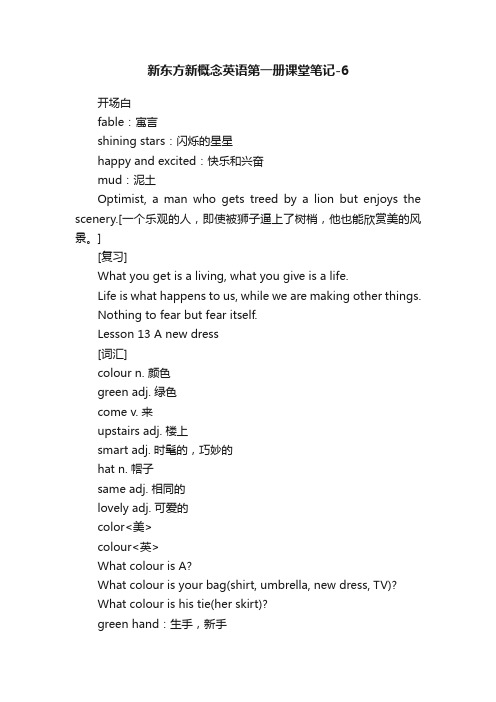
新东方新概念英语第一册课堂笔记-6开场白fable:寓言shining stars:闪烁的星星happy and excited:快乐和兴奋mud:泥土Optimist, a man who gets treed by a lion but enjoys the scenery.[一个乐观的人,即使被狮子逼上了树梢,他也能欣赏美的风景。
][复习]What you get is a living, what you give is a life.Life is what happens to us, while we are making other things.Nothing to fear but fear itself.Lesson 13 A new dress[词汇]colour n. 颜色green adj. 绿色come v. 来upstairs adj. 楼上smart adj. 时髦的,巧妙的hat n. 帽子same adj. 相同的lovely adj. 可爱的color<美>colour<英>What colour is A?What colour is your bag(shirt, umbrella, new dress, TV)?What colour is his tie(her skirt)?green hand:生手,新手green card:绿卡green thumb:[ ]有特殊园艺才能green light:绿灯;特权come on:跟着来;拜托了;快停下来吧here, there, upstairs, downstairs, home, abroad 地点副词前面不能加介词downtown:市中心go abroad, go home, come heresmart:机灵的,精明的wise:智慧的,聪明的(有生活阅历和更改判断)clever:聪明(理解力上);狡猾,精明bright:明亮的(小孩,年轻人)聪明的lovely:可爱的,秀丽的beautiful:美丽的(风景);漂亮的(女性,儿童)pretty:漂亮的,迷人的elegant:优雅的shapely:形状美观的(身材)[课文]What colour's your new dress?It's green.Come upstairs and see it.Thanks[笔误,应为Thank] you.Look!Here it is!That's a nice dress.It's very smart.My hat's new, too.What colour is it?It's the same colour.It's green, too.That is a lovely hat!Lesson 14 What colour's your…?A Rewrite these sentences.Example:This is Stella. This is her handbag.This is Stella's handbag.1 This is Paul. This is his car.This is Paul's car.2 This is Sophie. This is her coat.This is Sophie's coat.3 This is Helen. This is her dog.This is Helen's dog.4 This is my father. This is his suit.This is my father's suit.5 This is my daughter. This is her dress.This is my daughter's dress.B Write sentences using 's, his or her.Example:Steven/umbrella/blackWhat colour's Steven's umbrella? His umbrella's black.1 Steven/car/blueWhat colour's Steven's car? His car's blue.2 Tim/shirt/whiteWhat colour's Tim's shirt? His shirt's white.3 Sophie/coat/greyWhat colour's Sophie's coat? Her coat's grey.4 Mr. White/carpet/redWhat colour's Mr. White's carpet? Her carpet's red.5 Dave/tie/orangeWhat colour's Dave's tie? His tie's orange.6 Steven/hat/grey and blackWhat colour's Steven's hat? His hat's grey and black.7 Helen/dog/brown and whiteWhat colour's Helen's dog? His[应为Her,Helen为常用女名] dog's brown and white.8 Hans/pen/greenWhat colour's Hans’ pen? His pen's green.9 Luming/suit/greyWhat colour's Luming's suit? His suit's grey.10 Stella/pencil/blueWhat colour's Stella's pencil? Her pencil's blue.11 Xiaohui/handbag/brownWhat colour's Xiaohui's handbag? Her handbag's brown.12 Sophie/skirt/yellowWhat colour's Sophie's skirt? Her skirt's yellow.问题it's = it is(指代物体的单数它)this is 这是…here it is (口)地点副词whose 谁的人称代词几种情况:物主代词,名词性物主代词,名词所有格名词所有格:人名+'s “…的”(形容词性物主代词、名词性的物主代词)形容词性物主代词必须作定语,修饰别的词。

新东方考研英语笔记,阅读笔记首次暴光!!!听力词汇:①复习词汇(找出旧课本,熟识老单词)②记常用词汇记单词的方法:(1)重复(七遍或七遍以上)(2)应用,使用具体方法:同义、反义、对比联想记忆法乱序法词根词缀法结合阅读或背诵卡片一词多义语法:(1)句子结构和固定搭配(2)动词形式(3)代词还元听力的基本技巧:读、猜、听、写、查Part A的基本解题思路:1.扫描纵轴2.判断缺失信息3.注意回答4.拼读规律5.检查答案的格式(要与例句一致)要做到:1.扩充词汇:记忆词的搭配2.纠音(可以读新概念3、4)3.听写(介绍《Listen to this》)4.听一边不停,把名词、动词和数词记录下来不该做:1.不要泛听2.不要听英语新闻3.不要听太难的英语4.不要超过2个小时,不要少于半个小时5.不要看原文练听力6.不要边听边翻译Part B的基本解题思路:1.扫描题干,找出中心词,注意空格前后2.判断缺失信息以及询问信息种类3.用核心词的同义、反义以及题干的基本结构定位4.简写形式5.检查语法、拼写、单复数6.第二遍查漏补缺解题武器:1.否定词(定位词)2.数词3.专有名词4.比较级、最高级5.副词6.转折词7.介词Part C 的基本解题思路:1.扫描题干,划出核心词2.磁带开始后,综合嫂面选项3.所听及所得,顺序原则,最近答案原则4.检查,常识原则,诚实原则,同义相斥原则听力十四种题型1.段落主旨2.信息前置3.同义相斥4.否定词否定信息的辨析5.信息修正6.主旨题7.并列信息8.推断9.褒义词、贬义词10.去掉两个错误选项11.不要用自己的思路作题12.动词信息13.题干提供信息14.部分和整体读题时间1.Part A之前57~60s的时间去读part C的第二、三篇2.当听到“part A”时开始看part A3.读完part A第一遍后和读完第二遍后均看part B,当听到“part B”时看part B 4.当part B读完后读part C的第一篇Part A的错误可能性1.信息修正(两遍)2.速度陷阱3.计算(more ,less ,大小多少的计算,before ,age ,later ,度量衡的运算)4.没有拼写的地方(常用词,殖民地的地名,耳熟能详的---大写)Part B注意:1.听+写2.画核心词,两个(大体+具体)3.四个句型转换:疑问转换成陈述直接转换成间接主系表之间的转换主动与被动之间的转换4.回到时不要答非所问,填充时要符合要求Part C注意:1.边听边做2.以题干为主选项为辅3.翻页综合观察4.推测题的标志(1)表可能:could/would have ,may ,might(2)表希望:expect ,hope ,longing写作写作十大困境及对策一、滔滔不绝之“意识流”------提纲式最高原则1.自由分段2.语言杂乱二、无话可说真难受1.热点话题2.永恒话题,宏观话题(1)关于成功,对成功的理解(2)关于诚信(3)关于团结(4)关于住房(5)关于交通(6)关于环境(7)关于卫生(8)关于就业(9)关于教育(10)关于网络思维突破:<1 >例证突破法<2 >三项原因思维法<3 >报刊文章法<4 >高谈阔论法三、真情流露没必要(语言第一位,结构第二位,内容第三位)四、思维跳跃,断层多五、英语表达憋得慌六、盲目动笔凑字数七、低级错误常出现1.主谓一致2.时态3.冠词的使用4.名词单复数5.搭配6.拼写错误7.中文思维八、处于与被动危害大九、语言单调美变化十、龙飞凤舞笔记乱写作的题型1.提纲式作文2.图表式作文3.图画式作文4.情景式作文5.简单应用文翻译一、英、汉语两者之间的区别英语汉语1 形合意合2 聚集流散3 繁复简短4 被动主动5 抽象具体二、考研英语的题型1题材以议论文为主,内容和意思比较抽象2句子长、结构复杂、从句多3句子的意思表达与汉语的语序不对等三、考试内容1.专有名词、习惯用法、多意词2.翻译的一般性技巧(1)选词用字(2)词序调整(3)词性转换(4)增词(5)省词(6)正话翻说(7)主从句(8)拆句3.具体句型的翻译:定语、并列结构、倒装结构、被动语态四、评分标准五、问题与学习策略、准确理解、准确表达1.加强基本功的积累(1)单词,除基本词义外还要记住第一、二层的词义(2)语法2.多做练习六、考研翻译的基础知识1.翻译的标准(1)准确(2)顺通2.翻译的方法(1)直译(2)意译以直译为主,意译为辅3.翻译的过程四步翻译法:(1)通读全文,准确理解(2)分析成分,划分意群(3)选择词意,贴切表达(4)世道调整,书写译文具体实施:1.通读全句(1)在准确理解的基础上,按照英语语法结构拆分句子。
拆分的原则是语法沙个相对独立,意义上相对完整的语法单位。
(2)选找出句子的主干结构(主、谓、宾)在找出各种修饰成分,搞清修饰成份之间的关系。
2.此的处理:在句子关系中理解词语的特定含义,尤其是多义词。
(以上两个步骤是要达到英语理解准确而全面的目的)3.根据汉语的习惯重新组合句子,以保证汉语表达的通顺和标准,也就是说在句子中所有语法拆份清楚,所有的词语都没有疑义之后才开始汉语翻译,以符合汉语次序习惯为准则,对各个语法单位重新组合。
4.汉语句子的检查:通读全句,一方面要检查各个句子中的药店、难点,另一方面要注意句子的翻译的完整性,不可漏译、少译。
最后,句子要在语境中和文章内容一致,防止整个句子翻译错误、意义扭曲。
同位语从句的翻译:1.解释法2.可放在先行词前面,类似定于从句的方法定语从句:1.如果定语从句结构比较简单,信息负载量不大,并且与先行词的关系比较密切(限定性的定语从句)翻译时,把定语从句放在他所修饰的先行词前面,用“……的”这样的结构来表达。
常见的翻译技巧:增词法2.如果定语从句结构比较繁杂,信息负载量比较大,与先行词的关系不太密切,翻译是我们可以法定语从句放在所修饰的先行词的后面。
这样我们通常要重复先行词或代词代替先行词,有时需要加连词。
定语:(1)分词做定语(2)不定式做定语,一般来说,把定语翻译到定语中心词之前,但是因为分词和不定式有明显的动词特征,所以如果定语与中心词有明显的使动关系时,可以将定语翻译成中心词加谓语的结构。
常见的翻译技巧:词性调整,词性转换。
(3)介词短语做定语(4)形容词短语做定语,向前翻译比较结构:1.Less , more2.As……as , not as……as3.Rather than ,some than并列结构:并列结构是指两个或两个以上的并列成份有明显的连词标记,或标点符号连接,最常见的标记词是and还有其他固定结构or ,but ,both……and ,nether……nor ,not……but ,as well as ,not only……but also……,翻译时,比一定都翻译成合,可以根据意思来灵活翻译,但应该明显的表现并列结构,用比较一致的汉语词句来翻译。
状语、状语结构:一般来说,应语状语、状语从句照顺序来翻译即可,但状语和状语从句在汉语中位置都比较灵活,有时可根据汉语习惯把原因、时间和条件状语从句提前,放在主句之前翻译,状语则翻译在主语之后,动词之前,时间在前,地点在后。
倒装结构:翻译的要点在于在做好句子结构的分析,恢复其正常句子的顺序之后再进行翻译。
插入结构:1放在前面(语句子联系不紧密)2按从句的方式翻译被动结构:被动变主动1.英语中被动句使用极为广泛,尤其是科普类议论文,为了强调客观上的事实,不带主观感情,翻译是一般翻译成主动句,如果主语、宾语的主动关系明显,则采用主宾颠倒的方式把英语主动句的宾语作为汉语被动句的主语,有时被动句缺主语,则可以补上泛指的主语。
2.有时主宾关系不明显,也可以按照英语顺序翻译,一般不用被字结构。
但有时可以采用如“由……来,为……所”等被字结构,仍译成汉语的被字结构。
形式主语可以固定翻译,一般翻译到整句话前面。
完型填空一、出题特点及测试要点:(一)特点:1.首段首句不出题2.做题特点:通过已知信息点寻求未知答案3.体裁上的特点:议论文和说明文为主,多为议论文4.结构特点:总分结构5.完美性(二)测试要点1.阅读能力(1)主题一定在首段首句(2)上下句和上下段之间的逻辑关系(3)分清楚句子的内部结构2.英语知识运用的能力(1)语法20%~30%(2)固定搭配 10%(3)词义辨析 60%~70%形近词,同义词,搭配,专有名词二、发展趋势1.题量2.题材3.难度增加三、解题步骤:1.整体通读:2~3分钟2.按段精度:15分钟3.通读检查四、逻辑关系1.并列关系2.递进关系3.让步关系4.转折关系5.因果关系空为:动词:1.若动词为谓语可以看主语,注意主谓的搭配一致性(1)看主语是人还是物(2)看逻辑上的搭配是否合适2.看宾语(1)看宾语是抽象名词还是具体名词还是抽象具体名词(2)从动词的及物或不及物上做题3.从动词后的介词来确定动词,根据介词宾语来判断,介词宾语是人或是物4.考虑句子中其它能对这个动词形成限制性修饰的成分形容词:1.当形容词做表语时,主要看主语,注意主表搭配的一致性。
主表关系:对等或修饰关系。
2.当形容词修饰名词时,要注意修饰关系的一致性(1)当注意它的同指性(2)褒贬色彩的一致性3.当形容词修饰它后面的名词式。
该名词不仅受到所选该形容词的修饰也受到其他成分(其它形容词或定语从句)的修饰,这时答案要从其它形容词和定语从句中找。
4.当形容词在一个总体句时,答案可以通过总结分句得出。
5.当有副词对形容词进行修饰时,副词就是信息点6.通过关联手段名词:1.名词做主语时,看主谓搭配或主系搭配的一致性2.名词做宾语时,要看动宾搭配的一致性3.介词前后出现的名词可以通过介词来判断4.通过已有名词判断所学选名词,依据:褒贬色彩的一致性和语体色彩的一致性。
5.当所选的名词处在先行词的位置上,要看后面从句类型,定语从句,同位语从句。
副词:1.意义和程度上的一致性(绝对性和相对性)2.褒贬意义的一致性,色彩和句子的一致性(1)句子对应成份分析法,上下句、上下段(2)时间线索解题法(3)无关词排除法①主客观一致原则②褒贬色彩一致原则③语题色彩一致原则④及物动词和不及物动词一致原则⑤主谓搭配一致原则⑥动宾搭配一致原则⑦主系表搭配一致原则⑧绝对性相对性原则⑨与主题和态度倾向性一致原则⑩与近三年真题一致原则(4)如果总数句中考虑到实词,通过分析分句来做题(5)用同线关系做题(有相倾向关系的词做题)阅读:1.来源:西方的报刊杂志2.文体:议论文,说明文,记叙文,应用文3.历年考题:多为社会科学,自然科学,人文科学4.大纲key word:三步走:1.通读全文,抓住中心(1)文章叙述的主要内容是什么?(2)文章中有无题到核心概念?(3)作者大致态度是什么?2.仔细审题返回原文(1)通常是由题干出发,使用寻找关键词定位原则。